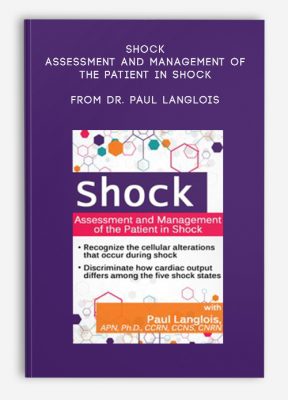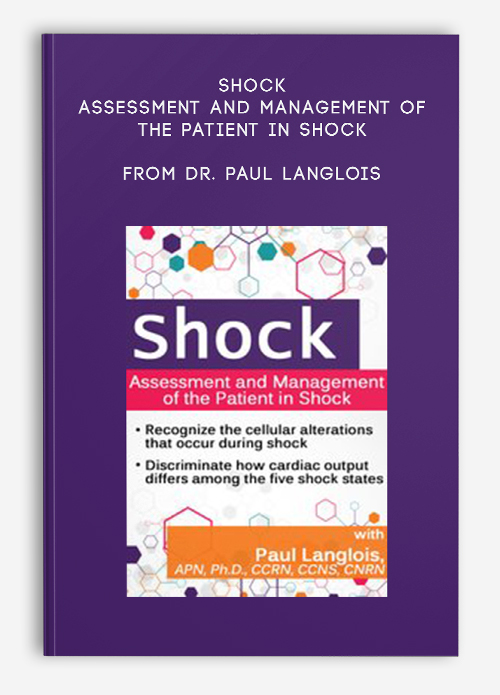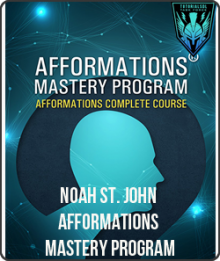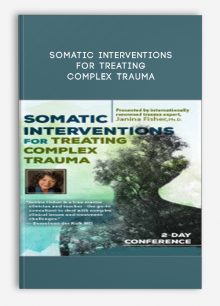Shock, Assessment and Management of the Patient in Shock from Dr. Paul Langlois
$59.00 $17.00

Shock, Assessment and Management of the Patient in Shock From Tissue Alterations to Resuscitation from Dr. Paul Langlois
Faculty:Dr. Paul Langlois
Duration:1 Hour 04 Minutes | Format:Audio and Video
Archive : Shock, Assessment and Management of the Patient in Shock from Dr. Paul Langlois
Get Shock, Assessment and Management of the Patient in Shock from Dr. Paul Langlois on Salaedu.com
Description:
Your patient’s lives depend on your ability to assess and act. There is little room for error.
Treatment protocols in Managing Shock change frequently and this seminar will teach you the latest up to the minute evidence based strategies in treatment of shock. You will learn how to rapidly assess, recognize and treat all types of shock and be able to use this in your clinical practice every day.
OUTLINE
Immediate Life-Saving Strategies
A-B-C-D
- Airway patent
- Breathing
- High fraction of inspired oxygen
- Mechanical Ventilation
- Circulation
- Central venous and arterial access
- Oxygen delivery
- Oxygen consumption
- Oxygen extraction ratio
- Differential diagnosis
- History
- Physical exam
- Laboratory data
Parameters to continuously monitor in all patients with shock
- Arterial blood gas versus oximetry and capnography
- Mixed venous blood gas
- Lactate and Lactic acid
- Cardiac output versus cardiac index
- Central venous pressure versus global end diastolic index
- Spinal cord dysfunction
- Signs and symptoms
- Treatment
Assessment and Treatment of Shock States
- Cardiogenic
- Hypovolemic
- Septic
- Neurogenic
- Obstructive
OBJECTIVES
- Recognize the cellular alterations that occur during shock
- Discriminate how cardiac output differs among the five shock states
- Determine three causes of cardiogenic shock
- Contrast the fluids used in resuscitation of the patient in hypovolemic shock
- Apply the resuscitation guidelines for septic shock
ABOUT THE SPEAKER
Dr. Paul Langlois, APN, PhD, CCRN, CCNS, is a critical care clinical specialist in the intensive units at Cook County Hospital (CCH), Chicago. IL; CCH is a Level I trauma center and academic medical center. Drawing on over 30 years of experience assessing and managing patients with life-threatening multi-system emergencies, Dr. Langlois provides advanced-level training to nurses, physician assistants, nurse practitioners, respiratory therapists and physicians. Dr. Langlois is committed to providing the highest quality of care to patients through advanced education. His presentations are evidence-based, timely and provide participants with case studies to facilitate critical thinking. As a bedside clinical nurse specialist, Dr. Langlois has developed several critical care and institution- wide protocols for the multidisciplinary assessment and management of the cardiac patient. These include: weaning from mechanical ventilation, pulmonary artery catheter and hemodynamic monitoring, vasoactive medications, ventricular assist devices, renal replacement therapy, and neurologic alterations after trauma.
Get Shock, Assessment and Management of the Patient in Shock from Dr. Paul Langlois on Salaedu.com
1 review for Shock, Assessment and Management of the Patient in Shock from Dr. Paul Langlois
Add a review Cancel reply
Related products
HEALTH - FITNESS - LIFESTYLE - MEDICAL
HEALTH - FITNESS - LIFESTYLE - MEDICAL
HEALTH - FITNESS - LIFESTYLE - MEDICAL
HEALTH - FITNESS - LIFESTYLE - MEDICAL
HEALTH - FITNESS - LIFESTYLE - MEDICAL
Somatic Interventions for Treating Complex Trauma with Janina Fisher, Ph.D. from Janina Fisher
HEALTH - FITNESS - LIFESTYLE - MEDICAL
HEALTH - FITNESS - LIFESTYLE - MEDICAL
Fitness Mentors – Audio Lectures, Practice Tests and Study Guide for the NASM CPT Ex










king –
“Dr. Langlois did a phenomenal job. I appreciated this lecture very much. “